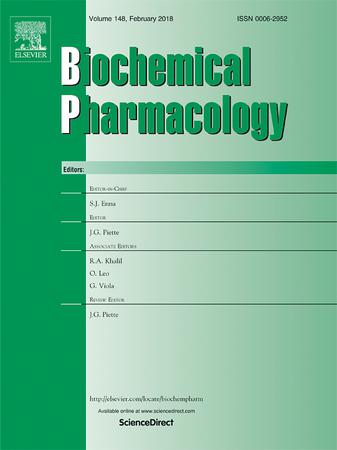JOSD2 promotes breast cancer metastasis by deubiquitinating and stabilizing SMAD4
IF 5.3
2区 医学
Q1 PHARMACOLOGY & PHARMACY
引用次数: 0
Abstract
Breast cancer is one of the most common malignant tumors among women worldwide, and its high degree of metastasis significantly impacts treatment effectiveness leading to poor prognosis. The potential molecular mechanisms underlying breast cancer metastasis remain to be further elucidated. In this study, via database analysis, we revealed that the deubiquitinase josephin domain containing 2 (JOSD2) was abnormally amplified in patients with metastatic breast cancer, and was significantly negatively correlated with patient prognosis. By integrating data from the Gene Expression Omnibus (GEO) database and Kyoto Encyclopedia of Genes and Genomes (KEGG) signaling pathway enrichment analysis, we found that the transforming growth factor beta (TGF-β) signaling pathway was significantly activated in breast cancer patients with increased JOSD2 expression. Further studies revealed that JOSD2 interacted with and stabilized SMAD family member 4 (SMAD4) by removing polyubiquitin chains. Inhibition of JOSD2 by RNA interference effectively inhibited the metastasis of breast cancer cells both in vitro and in vivo. In conclusion, our study not only reveals the role of JOSD2 in promoting breast cancer metastasis for the first time, but also indicates promising directions for the future development of deubiquitinase inhibitors, which could yield significant therapeutic benefits. Nevertheless, extensive research and development are required to fully realize this potential.

JOSD2通过去泛素化和稳定SMAD4促进乳腺癌转移。
乳腺癌是世界范围内女性最常见的恶性肿瘤之一,其转移程度高,严重影响治疗效果,导致预后不良。乳腺癌转移的潜在分子机制仍有待进一步阐明。本研究通过数据库分析发现,转移性乳腺癌患者脱泛素酶josephin结构域2 (JOSD2)异常扩增,且与患者预后呈显著负相关。通过整合Gene Expression Omnibus (GEO)数据库数据和京都基因与基因组百科全书(KEGG)信号通路富集分析,我们发现JOSD2表达升高的乳腺癌患者转化生长因子β (TGF-β)信号通路显著激活。进一步的研究表明,JOSD2通过去除多泛素链与SMAD家族成员4 (SMAD4)相互作用并稳定SMAD4。RNA干扰抑制JOSD2在体内和体外均能有效抑制乳腺癌细胞的转移。总之,我们的研究不仅首次揭示了JOSD2在促进乳腺癌转移中的作用,也为未来去泛素酶抑制剂的开发指明了有希望的方向,这些抑制剂可能会产生显著的治疗效益。然而,要充分发挥这一潜力,还需要进行广泛的研究和开发。
本文章由计算机程序翻译,如有差异,请以英文原文为准。
求助全文
约1分钟内获得全文
求助全文
来源期刊

Biochemical pharmacology
医学-药学
CiteScore
10.30
自引率
1.70%
发文量
420
审稿时长
17 days
期刊介绍:
Biochemical Pharmacology publishes original research findings, Commentaries and review articles related to the elucidation of cellular and tissue function(s) at the biochemical and molecular levels, the modification of cellular phenotype(s) by genetic, transcriptional/translational or drug/compound-induced modifications, as well as the pharmacodynamics and pharmacokinetics of xenobiotics and drugs, the latter including both small molecules and biologics.
The journal''s target audience includes scientists engaged in the identification and study of the mechanisms of action of xenobiotics, biologics and drugs and in the drug discovery and development process.
All areas of cellular biology and cellular, tissue/organ and whole animal pharmacology fall within the scope of the journal. Drug classes covered include anti-infectives, anti-inflammatory agents, chemotherapeutics, cardiovascular, endocrinological, immunological, metabolic, neurological and psychiatric drugs, as well as research on drug metabolism and kinetics. While medicinal chemistry is a topic of complimentary interest, manuscripts in this area must contain sufficient biological data to characterize pharmacologically the compounds reported. Submissions describing work focused predominately on chemical synthesis and molecular modeling will not be considered for review.
While particular emphasis is placed on reporting the results of molecular and biochemical studies, research involving the use of tissue and animal models of human pathophysiology and toxicology is of interest to the extent that it helps define drug mechanisms of action, safety and efficacy.
 求助内容:
求助内容: 应助结果提醒方式:
应助结果提醒方式:


